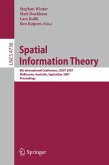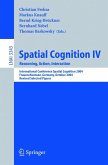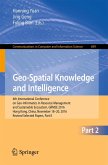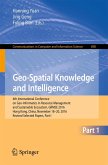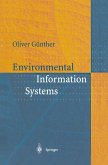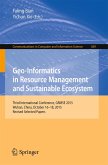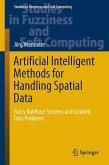Spatial Information Theory (eBook, PDF)
International Conference, COSIT 2005, Ellicottville, NY, USA, September 14-18, 2005, Proceedings
Redaktion: Cohn, Anthony G.; Mark, David M.
40,95 €
40,95 €
inkl. MwSt.
Sofort per Download lieferbar

20 °P sammeln
40,95 €
Als Download kaufen

40,95 €
inkl. MwSt.
Sofort per Download lieferbar

20 °P sammeln
Jetzt verschenken
Alle Infos zum eBook verschenken
40,95 €
inkl. MwSt.
Sofort per Download lieferbar
Alle Infos zum eBook verschenken

20 °P sammeln
Spatial Information Theory (eBook, PDF)
International Conference, COSIT 2005, Ellicottville, NY, USA, September 14-18, 2005, Proceedings
Redaktion: Cohn, Anthony G.; Mark, David M.
- Format: PDF
- Merkliste
- Auf die Merkliste
- Bewerten Bewerten
- Teilen
- Produkt teilen
- Produkterinnerung
- Produkterinnerung

Bitte loggen Sie sich zunächst in Ihr Kundenkonto ein oder registrieren Sie sich bei
bücher.de, um das eBook-Abo tolino select nutzen zu können.
Hier können Sie sich einloggen
Hier können Sie sich einloggen
Sie sind bereits eingeloggt. Klicken Sie auf 2. tolino select Abo, um fortzufahren.

Bitte loggen Sie sich zunächst in Ihr Kundenkonto ein oder registrieren Sie sich bei bücher.de, um das eBook-Abo tolino select nutzen zu können.
- Geräte: PC
- ohne Kopierschutz
- eBook Hilfe
- Größe: 8.41MB
Andere Kunden interessierten sich auch für
![Spatial Information Theory (eBook, PDF) Spatial Information Theory (eBook, PDF)]() Spatial Information Theory (eBook, PDF)40,95 €
Spatial Information Theory (eBook, PDF)40,95 €![Spatial Cognition IV, Reasoning, Action, Interaction (eBook, PDF) Spatial Cognition IV, Reasoning, Action, Interaction (eBook, PDF)]() Spatial Cognition IV, Reasoning, Action, Interaction (eBook, PDF)73,95 €
Spatial Cognition IV, Reasoning, Action, Interaction (eBook, PDF)73,95 €![Geo-Spatial Knowledge and Intelligence (eBook, PDF) Geo-Spatial Knowledge and Intelligence (eBook, PDF)]() Geo-Spatial Knowledge and Intelligence (eBook, PDF)40,95 €
Geo-Spatial Knowledge and Intelligence (eBook, PDF)40,95 €![Geo-Spatial Knowledge and Intelligence (eBook, PDF) Geo-Spatial Knowledge and Intelligence (eBook, PDF)]() Geo-Spatial Knowledge and Intelligence (eBook, PDF)40,95 €
Geo-Spatial Knowledge and Intelligence (eBook, PDF)40,95 €![Environmental Information Systems (eBook, PDF) Environmental Information Systems (eBook, PDF)]() Oliver GüntherEnvironmental Information Systems (eBook, PDF)40,95 €
Oliver GüntherEnvironmental Information Systems (eBook, PDF)40,95 €![Geo-Informatics in Resource Management and Sustainable Ecosystem (eBook, PDF) Geo-Informatics in Resource Management and Sustainable Ecosystem (eBook, PDF)]() Geo-Informatics in Resource Management and Sustainable Ecosystem (eBook, PDF)73,95 €
Geo-Informatics in Resource Management and Sustainable Ecosystem (eBook, PDF)73,95 €![Artificial Intelligent Methods for Handling Spatial Data (eBook, PDF) Artificial Intelligent Methods for Handling Spatial Data (eBook, PDF)]() Jörg VerstraeteArtificial Intelligent Methods for Handling Spatial Data (eBook, PDF)73,95 €
Jörg VerstraeteArtificial Intelligent Methods for Handling Spatial Data (eBook, PDF)73,95 €-
-
-
Produktdetails
- Verlag: Springer Berlin Heidelberg
- Seitenzahl: 500
- Erscheinungstermin: 27. September 2005
- Englisch
- ISBN-13: 9783540320203
- Artikelnr.: 44224221
Dieser Download kann aus rechtlichen Gründen nur mit Rechnungsadresse in A, B, BG, CY, CZ, D, DK, EW, E, FIN, F, GR, HR, H, IRL, I, LT, L, LR, M, NL, PL, P, R, S, SLO, SK ausgeliefert werden.
- Herstellerkennzeichnung Die Herstellerinformationen sind derzeit nicht verfügbar.
Anthony G. Cohn, University of Leeds, UK / David M. Mark, University at Buffalo, NY, USA
Vagueness, Uncertainty, and Gradation.- Anchoring: A New Approach to Handling Indeterminate Location in GIS.- Gradation and Map Analysis in Area-Class Maps.- Simulation of Obfuscation and Negotiation for Location Privacy.- Paths and Routes.- Investigating the Need for Eliminatory Constraints in the User Interface of Bicycle Route Planners.- Path Memory in Real-World and Virtual Settings.- Shortest Path Search from a Physical Perspective.- Ontology and Semantics.- Operationalising 'Sense of Place' as a Cognitive Operator for Semantics in Place-Based Ontologies.- Data-Driven Matching of Geospatial Schemas.- The Role of Spatial Relations in Automating the Semantic Annotation of Geodata.- Ontology and Spatial Relations.- Anatomical Information Science.- Matching Names and Definitions of Topological Operators.- Spatial Relations Between Classes of Individuals.- Spatial Reasoning.- Casl Specifications of Qualitative Calculi.- A Spatial Form of Diversity.- Structure and Semantics of Arrow Diagrams.- Cognitive Maps and Spatial Reasoning.- Cognitive Maps Are over 60.- Categorical Methods in Qualitative Reasoning: The Case for Weak Representations.- On Internal Cardinal Direction Relations.- Time, Change, and Dynamics.- Dynamic Collectives and Their Collective Dynamics.- A Linguistics-Based Framework for Modeling Spatio-temporal Occurrences and Purposive Change.- Ordering Events for Dynamic Geospatial Domains.- Landmarks and Navigation.- Structural Salience of Landmarks for Route Directions.- Expert and Non-expert Knowledge of Loosely Structured Environments.- Landmark Extraction: A Web Mining Approach.- Geographic Information.- Satellite Images - A Source for Social Scientists? On Handling Multiple Conceptualisations of Space in Geographical Information Systems.- 3DTopographic Data Modelling: Why Rigidity Is Preferable to Pragmatism.- Morse-Smale Decompositions for Modeling Terrain Knowledge.- Spatial Behavior.- 2D-3D MultiAgent GeoSimulation with Knowledge-Based Agents of Customers' Shopping Behavior in a Shopping Mall.- Memory for Spatial Location: Influences of Environmental Cues and Task Field Rotation.- Network and Psychological Effects in Urban Movement.- Abstracts of Keynote Talks.- Probabilistic Techniques for Mobile Robot Navigation.- Spatial Language, Spatial Thought: Parallels in Path Structure.
Vagueness, Uncertainty, and Gradation.- Anchoring: A New Approach to Handling Indeterminate Location in GIS.- Gradation and Map Analysis in Area-Class Maps.- Simulation of Obfuscation and Negotiation for Location Privacy.- Paths and Routes.- Investigating the Need for Eliminatory Constraints in the User Interface of Bicycle Route Planners.- Path Memory in Real-World and Virtual Settings.- Shortest Path Search from a Physical Perspective.- Ontology and Semantics.- Operationalising 'Sense of Place' as a Cognitive Operator for Semantics in Place-Based Ontologies.- Data-Driven Matching of Geospatial Schemas.- The Role of Spatial Relations in Automating the Semantic Annotation of Geodata.- Ontology and Spatial Relations.- Anatomical Information Science.- Matching Names and Definitions of Topological Operators.- Spatial Relations Between Classes of Individuals.- Spatial Reasoning.- Casl Specifications of Qualitative Calculi.- A Spatial Form of Diversity.- Structure and Semantics of Arrow Diagrams.- Cognitive Maps and Spatial Reasoning.- Cognitive Maps Are over 60.- Categorical Methods in Qualitative Reasoning: The Case for Weak Representations.- On Internal Cardinal Direction Relations.- Time, Change, and Dynamics.- Dynamic Collectives and Their Collective Dynamics.- A Linguistics-Based Framework for Modeling Spatio-temporal Occurrences and Purposive Change.- Ordering Events for Dynamic Geospatial Domains.- Landmarks and Navigation.- Structural Salience of Landmarks for Route Directions.- Expert and Non-expert Knowledge of Loosely Structured Environments.- Landmark Extraction: A Web Mining Approach.- Geographic Information.- Satellite Images - A Source for Social Scientists? On Handling Multiple Conceptualisations of Space in Geographical Information Systems.- 3DTopographic Data Modelling: Why Rigidity Is Preferable to Pragmatism.- Morse-Smale Decompositions for Modeling Terrain Knowledge.- Spatial Behavior.- 2D-3D MultiAgent GeoSimulation with Knowledge-Based Agents of Customers' Shopping Behavior in a Shopping Mall.- Memory for Spatial Location: Influences of Environmental Cues and Task Field Rotation.- Network and Psychological Effects in Urban Movement.- Abstracts of Keynote Talks.- Probabilistic Techniques for Mobile Robot Navigation.- Spatial Language, Spatial Thought: Parallels in Path Structure.

